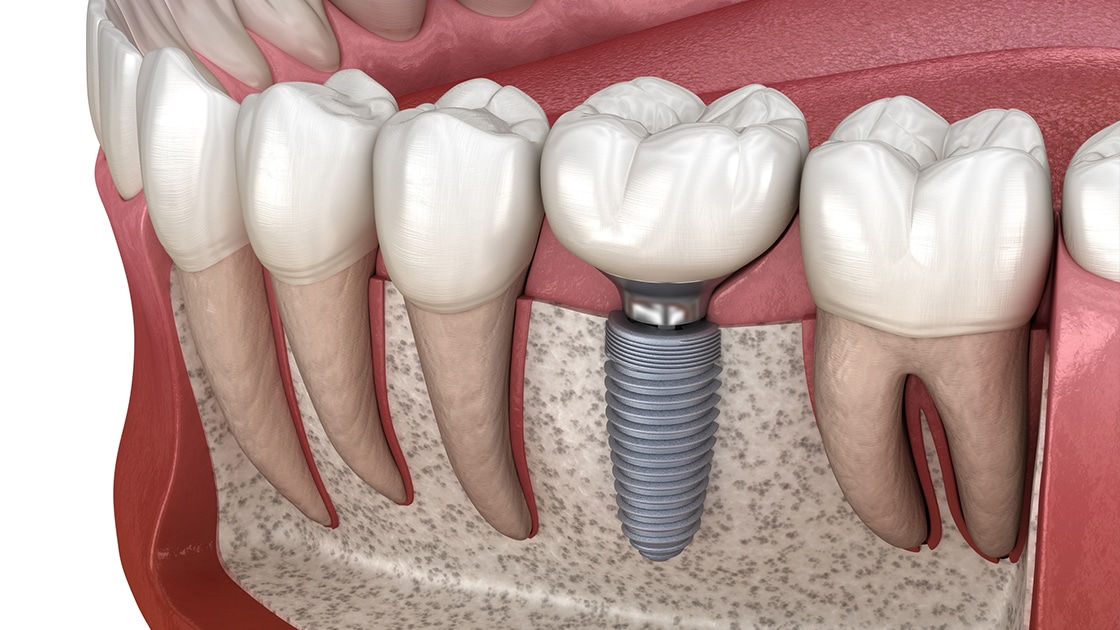All About Dental Sense
The Dental Sense Diaries
Table of ContentsWhat Does Dental Sense Do?Facts About Dental Sense RevealedThe Basic Principles Of Dental Sense The Dental Sense Diaries
are clinical gadgets operatively dental implanted right into the jaw to bring back a person's ability to chew or their appearance. They supply assistance for fabricated (phony) teeth, such as crowns, bridges, or dentures. When a tooth is lost as a result of injury or condition, a person can experience complications such as rapid bone loss, faulty speech, or modifications to chewing patterns that result in discomfort.Oral dental implant systems are composed of a dental implant body and dental implant abutment and might also consist of an abutment addiction screw. Cosmetic dentistry services. The dental implant body is surgically inserted in the jawbone in place of the tooth's origin. The dental implant abutment is generally affixed to the implant body by the abutment fixation screw and prolongs with gums into the mouth to support the attached synthetic teeth
(https://telegra.ph/Transform-Your-Smile-Dental-Implants-Root-Canal-Procedures-and-Professional-Teeth-Whitening-01-11)Framework of The Oral Implant System choosing oral implants, speak to your dental provider regarding the possible benefits and risks, and whether you are a candidate for the procedure. Things to think about: Your general health is a crucial consider identifying whether you are a great prospect for oral implants, how much time it will certainly take to recover, and for how long the dental implant may remain in place.
Smoking may influence the recovery process and decrease the long-term success of the implant. The healing process for the implant body may take a number of months or longer, throughout which time you typically have a momentary abutment instead of the tooth. the dental implant treatment: Meticulously adhere to the dental health instructions offered to you by your oral supplier.
The Dental Sense Ideas
Implant failing can cause the requirement for one more operation to deal with or change the implant system. Restores the capability to chew Recovers aesthetic appearance Aids keep the jawbone from diminishing due to bone loss Maintains the health and wellness of the surrounding bone and periodontals Helps maintain surrounding (close-by) teeth steady Improves top quality of life Damages to surrounding all-natural teeth throughout dental implant placement Injury to the surrounding cells during surgical procedure, such as sinus perforation Injury throughout surgical treatment (for instance, fracture of surrounding jawbone) Poor feature, such as seeming like the teeth do not bite with each other normally A feeling that the tooth is loose or turning in area resulting from a joint screw loosening up Implant body failing (looseness of the dental implant body) as a result of systemic infection, which may be more probable in clients with unchecked diabetics issues due to local infection in bone and gum tissues supporting the implant body due to delayed healing, which might be a lot more likely in clients who smoke Problem cleaning up the gums around the implant, resulting in inadequate dental health Without treatment gum disease Post-surgical tingling as a result of nerve impingement or damages Constantly notify health treatment suppliers and imaging service technicians that you have oral implants prior to any magnetic vibration imaging (MRI) or x-ray treatments.
FDA is not familiar with any kind of negative events reported for MRI or x-ray treatments with oral implants. Oral implants systems are typically made of products that follow worldwide consensus standards of the International Company for Standardization (ISO) or ASTM International. These requirements have information of what makes a secure product.

An oral implant is a framework that changes a missing out on tooth. With screw-like tools, the specialist inserts an implant right into the jawbone, and it acts as an anchor for a synthetic tooth, called a crown.
Excitement About Dental Sense
Some individuals are not eligible for dental implant surgical procedure. It is for dental doctors to run on people with: acute illnessuncontrollable metabolic diseasebone or soft tissue illness or infectionIf these concerns are settled, a person can have the surgical procedure. In, oral specialists refrain from operating individuals with: If people with any of the above undergo dental implant surgery, there is a higher danger of the implant stopping working.

Oral implant surgery is a personalized procedure. It's not the same for every person. However the following gives a basic overview of what you can anticipate your dentist, dental surgeon, periodontist or prosthodontist to do: Place the implant operatively. Offer you time to recover. Attach the message and last crown, bridge or denture.
Next, your cosmetic surgeon will thoroughly position the oral implant into your jaw. Your surgeon will reposition your gum tissues and shut the incision with stitches. If your dental implant is near the front of your mouth, your dentist will certainly make a short-term tooth for you to use until you heal. By doing this, you will not have a gap in your smile while you recoup.
The Ultimate Guide To Dental Sense
During the healing phase, your jawbone should fuse to the oral implant. This process can take anywhere from 3 to nine months.
Once your implant heals, your dental practitioner can attach the abutment (little adapter blog post) and your final remediation (crown, bridge or denture). This normally takes about one hour to complete and might call for a second small surgery. You should not really feel any type of discomfort during your oral implant treatment because your service provider will certainly make use of drug to numb your gums.